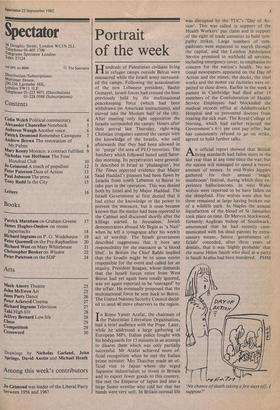Portrait
of the week
Hundreds of Palestinian civilians living in refugee camps outside Beirut were massacred while the Israeli army surround- ed the camps. Following the assassination of the new Lebanese president, Bashir Gemayel, Israeli forces had crossed the lines previously held by the multinational peacekeeping force (which had been withdrawn on American instructions), and moved into the Moslem half of the city. After meeting only light opposition the Israelis surrounded the camps. Hours after their arrival last Thursday, right-wing Christian irregulars entered the camps with the knowledge of the Israelis, who said afterwards that they had been allowed in to 'purge' the area of PLO terrorists. The butchery which followed lasted until Satur- day morning. Its perpetrators were general- ly described in Israel as `phalangists', but The Times reported evidence that Major Saad Haddad's gunmen had been flown by Israelis from south Lebanon to Beirut to take part in the operation. This was denied both by Israel and by Major Haddad. The Israeli Government at first denied that it had either the knowledge or the power to prevent the massacre, but it soon became known that the matter had been reported to the Cabinet and discussed shortly after the killings started. In Jerusalem, Jewish demonstrators abused Mr Begin as 'a Nazi' when he left a synagogue after his weekly act of worship. The Israeli government described suggestions that it bore any responsibility for the massacre as 'a blood libel'. In Britain the Chief Rabbi implied that the Israelis might be to some extent responsible for the event and called for an inquiry. President Reagan, whose demands that the Israeli forces retire from West Beirut had yet again been totally ignored, was yet again reported to be 'outraged' by the affair. He eventually proposed that the multinational force be sent back to Beirut. The United Nations Security Council decid- ed to send 40 more observers to the region.
In Rome Yasser Arafat, the chairman of the Palestinian Liberation Organisation, had a brief audience with the Pope. Later, while he addressed a large gathering of European MPs, Italian police fought with his bodyguards for 15 minutes in an attempt to disarm them which was only partially successful. Mr Arafat achieved more of- ficial recognition when he met the Italian prime minister. Mrs Thatcher made an of- ficial visit to Japan where she urged Japanese industrialists to invest in Britain and to export fewer goods to this country. She met the Emperor of Japan and also a large Sumo wrestler who told her that her hands were very soft. In Britain normal life
was disrupted by the TUC's 'Day of Ac- tion'. This was called in support of the Health Workers' pay claim and in support of the right of trade unionists to hold sym- pathy strikes. Large numbers of sym- pathisers were expected to march through the capital, and the London Ambulance Service promised to withhold all services, including emergency cover, to emphasise its concern for the nation's health. No na- tional newspapers appeared on the Day of Action and the mines, the docks, the steel works and the motor car factories were ex- pected to close down. Earlier in the week a patient in Cambridge had died after 15 members of the Confederation of Health Service Employees had blockaded the medical records office at Addenbrooke's Hospital and so prevented doctors from treating the sick man. The Royal College of Nursing, which had earlier rejected the Government's 6'/ per cent pay offer, but has consistently refused to go on strike, agreed to hold further talks.
A n official report showed that British riliving standards had fallen more in the last year than at any time since the war; but the nation still managed to spend a record amount of money. In mid-Wales hippies gathered for their annual 'magic mushroom' festival, during which they ex- perience hallucinations. In west Wales wolves were reported to be have fallen on the sheepfold. Five wolves were shot but three remained at large having broken out of a wildlife park. In Naples the annual liquefaction of the blood of St Januarius took place on time. Dr Mervyn Stockwood, formerly Anglican bishop of Southwark, announced that he had recently com- municated with his dead parents by extra- sensory means. Senior 'government of- ficials' conceded, after three years of denials, that it was 'highly probable' that the nurse Helen Smith who died at a party in Saudi Arabia had been murdered. PHM 'No chance of death taking a few days off, I suppose?'


































 Previous page
Previous page